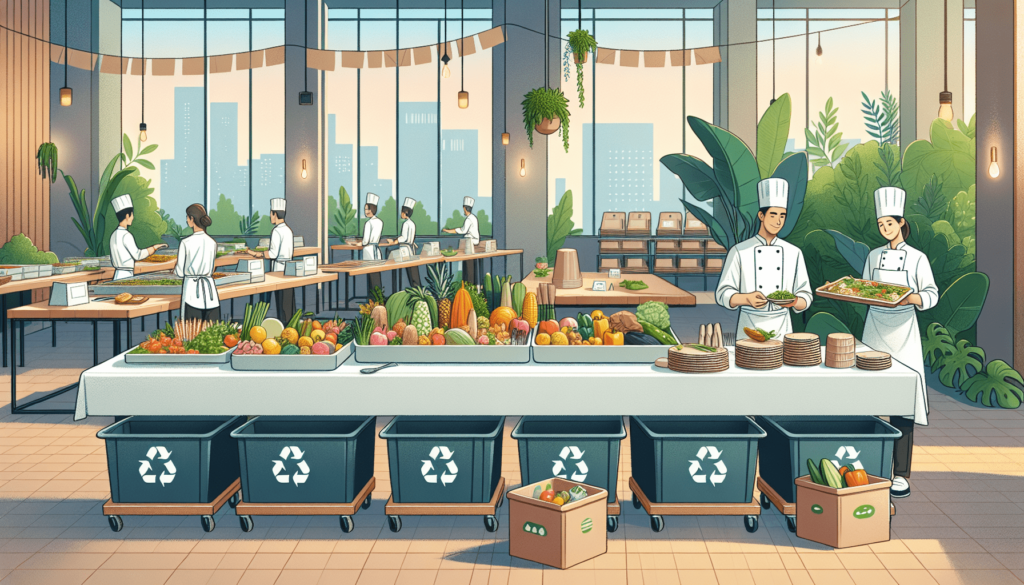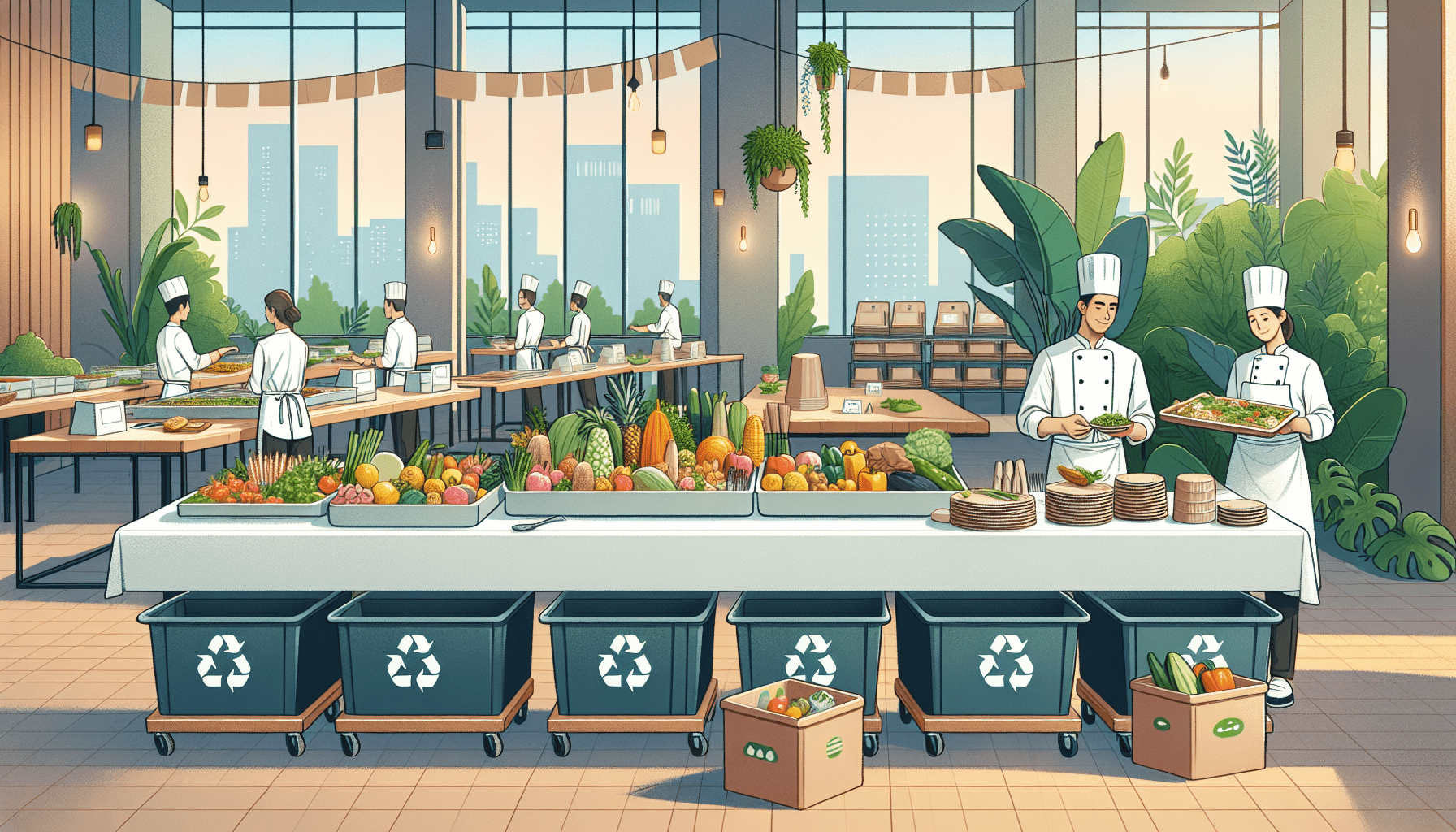Are you planning an event and looking for ways to make it more environmentally friendly? Look no further! In this article, we will provide you with tips and ideas on how to incorporate sustainable practices into your event catering. From sourcing local and organic ingredients to minimizing food waste, we’ve got you covered. So, let’s dive in and discover how you can host a sustainable event without compromising on taste or style.
1. Menu Planning
When it comes to planning a sustainable event, one of the most important aspects to consider is the menu. By making conscious choices about the ingredients you use, you can significantly reduce the environmental impact of your catering. Consider sourcing local and seasonal ingredients whenever possible. Not only does this support local farmers, but it also reduces the carbon footprint associated with transporting food long distances. Additionally, offering vegetarian and vegan options is key to catering to diverse dietary preferences and reducing the reliance on animal agriculture.
Another way to make your menu more sustainable is by reducing the consumption of red meat and dairy products. Livestock production contributes to deforestation, water pollution, and greenhouse gas emissions. By promoting plant-based dishes and incorporating more sustainable protein sources like legumes and plant-based proteins, you can help mitigate these environmental impacts.
Lastly, it is important to source sustainable seafood. Overfishing and destructive fishing practices have put tremendous strain on marine ecosystems. Choosing seafood that is certified or labeled as sustainable, such as seafood with the Marine Stewardship Council (MSC) certification, ensures that you are not depleting already vulnerable fish populations and contributing to the degradation of our oceans.
2. Food Sourcing
In addition to menu planning, the sourcing of food plays a crucial role in sustainable event catering. Opt for local suppliers and farmers who prioritize sustainable farming practices. By supporting local food systems, you reduce the carbon emissions associated with long-distance transportation and help small-scale farmers thrive. Engaging with organic food producers is another important aspect of sustainable sourcing. Organic farming practices prioritize the use of natural fertilizers and avoidance of synthetic pesticides, which helps protect soil health and minimize chemical runoff into waterways.
Supporting fair trade products further contributes to sustainable food sourcing. Fair trade certification ensures that workers are paid fair wages and are provided with safe working conditions. By choosing fair trade products such as coffee, tea, and chocolate, you can help uplift marginalized communities and support ethical trade practices.
Food waste reduction should also be a consideration when sourcing and planning food for your events. Look for suppliers and farmers who have implemented strategies to reduce food waste, such as using imperfect produce or donating surplus food to those in need. By reducing food waste, you not only minimize environmental impact but also demonstrate your commitment to responsible and conscious catering practices.

3. Waste Management
Proper waste management is essential for sustainable event catering. Promote composting and recycling by providing clearly labeled bins throughout your event space. Educate your guests and staff about what can be composted, recycled, or needs to be disposed of as waste. This not only helps divert waste from landfills but also allows for valuable resources to be reused.
Additionally, using biodegradable or compostable servingware is another way to reduce waste. Opt for plates, cutlery, and cups made from materials such as bamboo, sugarcane, or compostable plastics. These materials break down more easily in composting facilities, reducing the environmental impact of single-use items.
Minimizing the use of single-use plastics is crucial for waste reduction. Whenever possible, choose reusable options instead. For example, instead of individual plastic water bottles, serve water in jugs and encourage guests to refill their glasses. This simple switch can eliminate a significant amount of plastic waste.
Furthermore, consider donating excess food to local charities. Many organizations are willing to accept and distribute leftover food to those in need. By donating, you not only help reduce food waste but also contribute to fighting food insecurity in your community.
4. Energy Efficiency
Energy efficiency plays a vital role in sustainable event catering. Opting for energy-efficient catering equipment, such as refrigerators, ovens, and dishwashers, can significantly reduce energy consumption. Look for appliances with ENERGY STAR certification, as they are designed to operate more efficiently and save energy.
Utilizing renewable energy sources further reduces the environmental impact of your catering operations. By sourcing electricity from solar panels or wind turbines, you can power your event with clean, renewable energy. Consider partnering with renewable energy providers in your area to make this transition.
Utilizing natural lighting and ventilation also helps conserve energy. When possible, take advantage of natural sunlight and fresh air instead of relying solely on artificial lighting and air conditioning. This not only reduces energy consumption but also creates a more pleasant and inviting atmosphere for your guests.
Lastly, encourage responsible energy consumption among your staff. Train them on energy-saving practices, such as turning off appliances when not in use or adjusting the thermostat when the venue is not in use. Their active participation will contribute to a more sustainable event.

5. Water Conservation
Water conservation is another crucial aspect of sustainable event catering. Opt for serving water in jugs instead of individual bottles. This reduces the amount of plastic waste generated and encourages guests to refill their glasses, promoting responsible water consumption.
Implement water-saving practices in food preparation, such as using efficient dishwashing techniques and avoiding unnecessary water usage. Educate your kitchen staff on the importance of conserving water and provide them with tools to minimize water wastage during food preparation.
Investing in water-efficient dishwashers is also a sustainable choice. ENERGY STAR-certified dishwashers use less water and energy compared to conventional models while still effectively cleaning dishes and utensils. These appliances can significantly reduce water usage in your catering operations.
6. Eco-Friendly Packaging
Packaging is often a significant source of waste in catering operations. To minimize your environmental impact, use biodegradable or compostable packaging materials whenever possible. Choose packaging made from renewable resources, such as plant-based plastics or compostable papers. These materials break down more easily in composting facilities, reducing their impact on the environment.
Avoid excessive packaging by opting for minimalistic designs and sizes that are appropriate for the food being served. Excessive packaging not only increases waste but also adds unnecessary costs to your catering operations.
Consider reusable or recyclable options for packaging. For example, use containers that can be washed and reused instead of single-use options. If reusable packaging is not feasible, ensure that any packaging materials used can be easily recycled in the local recycling infrastructure.
Educate your guests about proper disposal of packaging materials by providing clear signage and instructions. By empowering them with the knowledge to dispose of packaging properly, you can help ensure that waste is diverted to the appropriate streams.
7. Transportation and Logistics
Transportation and logistics are areas where you can make a significant impact on the sustainability of your event catering. Choose venues with good public transportation access, as this encourages guests to utilize eco-friendly transportation options. Providing clear directions and information about public transportation options can further incentivize guests to choose greener transportation methods.
Encourage carpooling among guests or provide shuttle services from designated meeting points. Carpooling reduces the number of vehicles on the road, thus minimizing carbon emissions. Shuttle services not only make transportation more convenient for guests but also help reduce the environmental impact of individual car travel.
Consider offsetting the carbon emissions generated by transportation through carbon offset programs. These programs invest in projects that reduce greenhouse gas emissions, such as renewable energy or reforestation initiatives. Offset programs can help neutralize the emissions associated with transportation to and from your event.
Optimize event logistics to reduce transportation needs. By carefully planning the flow of your event and grouping activities or stations together, you can minimize the need for guests and staff to travel long distances within the venue. This not only saves time but also reduces carbon emissions.
8. Alternative Food Service Ideas
Thinking outside the box can lead to innovative and eco-friendly food service ideas that set your event catering apart. Consider food truck catering with eco-friendly options. Food trucks allow for flexible and mobile catering, reducing the need for large, stationary kitchen setups. Choose food trucks that prioritize sustainable practices, such as sourcing local ingredients or utilizing energy-efficient equipment.
Hosting farm-to-table dining experiences is another way to create unique and sustainable events. Collaborate with local farmers and showcase their seasonal produce in your menu. By connecting guests with the food’s origins and supporting local agriculture, you create a memorable and sustainable dining experience.
Zero-waste cooking and meal planning can be an exciting challenge for your catering team. Embrace creative ways to use all parts of ingredients, minimize food waste, and find innovative ways to repurpose leftovers. By demonstrating how delicious and sustainable zero-waste cooking can be, you inspire others to reduce waste in their own lives.
For the adventurous and nature-loving crowd, organizing wild foraging and local ingredient workshops can be an immersive and educational experience. Engage experts who can teach participants how to identify and ethically harvest wild foods. By fostering a deeper connection to the environment and local ecosystems, you promote sustainable food practices.
9. Collaborations and Partnerships
Collaborating with like-minded individuals and organizations can strengthen your commitment to sustainability in event catering. Engage with sustainable event planners who specialize in creating eco-friendly experiences. These professionals can provide valuable insights, advice, and resources to help you execute sustainable events seamlessly.
Partnering with caterers and vendors who share your commitment to sustainability can amplify your impact. By working together, you can pool resources and expertise to create more sustainable events. Supporting local charities and environmental organizations is another way to collaborate for a greater cause. By including them in your events, you not only contribute to their missions but also raise awareness among your guests.
Collaborating with eco-friendly beverage providers is an important aspect of sustainable event catering. Choose brands that prioritize sustainable sourcing, production, and packaging. Explore options for local or organic beverages, as these often have a lower carbon footprint and contribute to a more sustainable menu overall.
10. Education and Awareness
Education and awareness play a vital role in fostering a sustainable mindset among guests, staff, and the wider community. Provide information about sustainable practices at your events. Display signs, posters, or digital displays that highlight your efforts to reduce waste, conserve energy and water, and source responsibly. By sharing your sustainability goals and achievements, you inspire others to take action and make more conscious choices.
Offer cooking demonstrations and workshops to teach guests how to prepare sustainable meals at home. Showcasing delicious plant-based recipes or innovative ways to reduce food waste can empower individuals to make a positive impact in their own kitchens.
Host panel discussions on food sustainability that bring together experts and thought leaders in the field. These discussions can delve into important topics such as regenerative agriculture, food justice, and the role of sustainable catering in shaping a more environmentally friendly future.
Share success stories and case studies from your own events or from the industry as a whole. Highlight the positive impact that sustainable event catering can have on the environment, local communities, and the overall guest experience. By sharing these stories, you inspire others to adopt sustainable practices and contribute to a greener future.
In conclusion, sustainable event catering is a multifaceted endeavor that requires thoughtful planning and consideration. By implementing the tips and ideas outlined in this article, you can create memorable events while minimizing your environmental impact. Remember, every small step towards sustainability counts, and by making conscious choices, you contribute to a more sustainable future for the catering industry.

